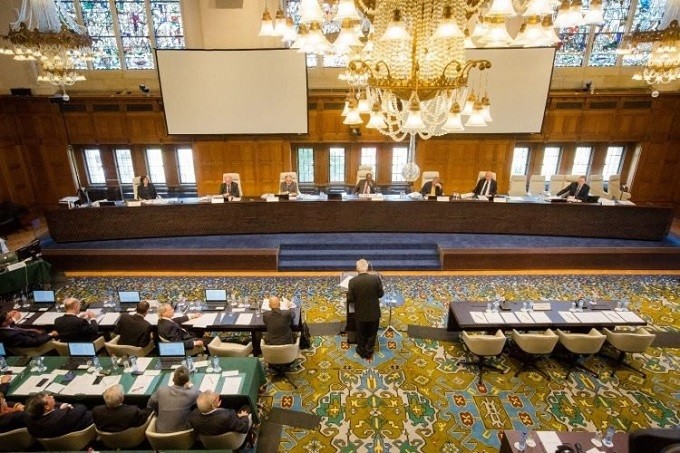(VOVWORLD) - On July 12, 2016, the Permanent Court of Arbitration, the arbitral tribunal constituted under Annex VII of the United Nations Convention on the Law of the Sea in The Hague, issued a landmark ruling on the Philippine’s law suit against China regarding the South China Sea, known as the East Sea in Vietnam. Five years later the situation in the East Sea remains unresolved. But it’s undeniable that, together with the 1982 UNCLOS, the PCA’s ruling is an important legal foundation for resolving the East Sea disputes peacefully and ensuring maritime order.
 PCA arbitral tribunal on 7-13 July, 2016 judges Philippines' case against China's claims in the East Sea. (Photo: PCA) PCA arbitral tribunal on 7-13 July, 2016 judges Philippines' case against China's claims in the East Sea. (Photo: PCA) |
The PCA’s ruling said China’s declared “9-dash line” provides no legal basis for China’s claim of an “historic right” to resources in the East Sea. The ruling means China has neither the right to claim an exclusive economic zone nor the “historic right” to claim sovereignty in order to exploit resources in the area.
PCA’s ruling drew widespread attention
The court’s ruling drew a great deal of attention from countries involved in sovereignty disputes in the East Sea as well as many countries outside the region. World leaders delivered statements and scholars wrote mountains of commentary touting the ruling as a legal foundation for minimizing and resolving disputes in the East Sea. The international community said the PCA ruling upheld international law in the East Sea disputes, underscored the duties of involved parties within the framework of the 1982 UNCLOS, and condemned unilateral actions that violate international law and cause instability.
In the years since the ruling, the situation in the East Sea has not developed in line with the ruling in any way, but it has at least served as a catalyst for stronger reaction against China’s activities in the East Sea. The East Sea disputes and compliance with the 1982 UNCLOS have been subjects of discussion at many international forums and conferences.
2020 saw a “war of public notes”, with many countries directly or indirectly mentioning the PCA’s ruling in 2016 in favor of the Philippines and challenging China's claims. It’s clear that the East Sea has become, not just a regional issue, but a shared concern of countries around the world.
In June 2021 100 UN members joined the “Group of Friends of the 1982 UNCLOS”. Many more countries have embraced freedom of navigation operations (FONOP) in the East Sea, to demonstrate their opposition to illegal sovereignty claims. These are direct effects of the PCA’s ruling 5 years ago.
No place for unilateral intentions in the East Sea
The East Sea has a strategic geopolitical importance not just for coastal states but for all of Southeast Asia and the world. The East Sea connects the Pacific and Indian Oceans, Europe and Asia, and the Middle East and Asia, giving it a crucial role in global maritime trade.
Maintaining peace, stability, and safety in the East Sea is something that concerns all countries. Disputes in the East Sea must be resolved peacefully based on international law without unilateral intentions.
The ruling of the PCA must be honored. The East Sea is a test for countries to prove their commitment to maintaining peace, stability, and a law-based international order.